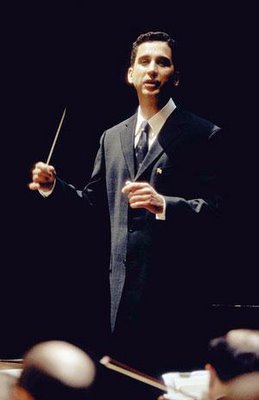The "M" Word
 One half of Ionarts was gleeful when the Baltimore Symphony Orchestra cancelled their Messiah at Strathmore. I myself forgot to strike that date from my calendar and almost showed up for it anyway, which would have been less amusing. I had also heard rumors that the program (I rarely check beforehand) actually offered the Mozart version – in which case I would have loved to hear that and been happy to skip the National Symphony’s Messiah at the Kennedy Center this Thursday. But the codex demands that all music critics cover at least one “M-performance” during the season, and this time I drew the shortest straw.
One half of Ionarts was gleeful when the Baltimore Symphony Orchestra cancelled their Messiah at Strathmore. I myself forgot to strike that date from my calendar and almost showed up for it anyway, which would have been less amusing. I had also heard rumors that the program (I rarely check beforehand) actually offered the Mozart version – in which case I would have loved to hear that and been happy to skip the National Symphony’s Messiah at the Kennedy Center this Thursday. But the codex demands that all music critics cover at least one “M-performance” during the season, and this time I drew the shortest straw.
It could have been worse. The volunteer Baroque core of the NSO showed up, with 80 heads from Robert Shafer’s Washington Chorus and gave a fine performance that demanded neither great praise nor harsh criticism as a whole. As far the elements that made it up are concerned, it was a mixed bag; but here, too, everyone operated in the safe zone. Reducing a modern orchestra to two dozen strings and assorted winds doesn’t exactly make for a period practices performance – it is at best a shy nod in that direction. Unfortunately it is an (ultimately economic) fact that the type of classical music lovers who would go crazy for true period performance practice concerts simply don’t exist in sufficient numbers to merit even one performance of a such a Messiah in the Concert Hall (much less four), and most of the typical Messiah crowd would feel short-changed if someone mounted a McCreesh or Junghänel-type performance with a chorus of two to the part and chamber orchestra.
Tim Page, De Cou Brings Fresh Ideas to NSO's 'Messiah' (Washington Post, December 16) |
The singers' biographies were a bit more impressive than their performances, even though all soloists turned in performances that were fine and more. The only real weakness was the novelty of the performance, the inclusion of a treble. Chalky-voiced and pale, it was not a contribution. Just having come off the Vienna Choir Boys’ concert (and they weren’t exactly perfect, either) only underscored the kid’s disappointing performance. Algiers-born Amel Brahim-Djelloud had the fewest names to drop in her bio but was the most even and delightful singer on stage. Agile, unmannered, fair-sized: an all-around unthreatening pleasure. Catalan Xavier Sabata’s countertenor was serviceable, his “He was despised” particularly earth-bound. Yet, I’ve heard much worse – and Al Ayre Español, Jordi Savall’s La Capella Reial, René Jacobs, and William Christie (for his Jardin des voix) surely have heard the young man in better form when they chose to include him in their prestigious and excellent troupes.
G.F. Handel, Saul, R. Jacobs |
The evening was solidly between professional hazard and heavenly delight – good enough not to disappoint but not inspirational, either. I consider it good practice for the NSO players for one of the upcoming highlights of the season, a Helmut Rilling-conducted performance of Bach’s Matthew Passion. Those in need of their “M”-fix can safely chose one of the three repeat performances on Friday or Saturday at 8PM or Sunday’s matinee at 1PM. Others, still, who like their Handel this time of the season but have ambiguous feelings about another Messiah could do worse than treat themselves to the marvelous new René Jacobs recording of Saul for Christmas.




















































